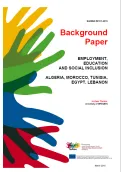Employment, Education and Social Inclusion in Algeria, Morocco, Tunisia, Egypt and Lebanon

SAHWA Background Paper nº. 1
This paper combines two different theoretical concepts of social inclusion and (as its converse) social exclusion in the fields of education and employment/labour market in five Arab Mediterranean countries (Algeria, Morocco, Tunisia, Egypt and Lebanon): the structural determined concept of social inclusion/exclusion on the macro and meso level (e.g.policies, laws, socio-economic conditions and the individual/group level concept on the micro level. Insofar this paper considers institutional settings as well as individual dimensions, using harmonized data and statistics, which enables cross-country comparisons. First the paper starts with key issues of socio-economic information (demography, urbanization, economy) as a frame for the then following fields of education and employment/labour market. The paper concludes with a summary of major aspects of social inclusion/exclusion, using the UNDP Human Development Index as a general term combining major aspects of social inclusion/exclusion. Subsequently the performance of the countries´ elites (and here especially the governments) to meet the challenges of social exclusion are described. Last but not least similarities and differences social exclusion of young people in AMCs and Europe as well as a discussion about the outcome of the popular revolts in some Maghreb and Machrek countries in 2010/2011, referring to the paper´s topic are presented. Finally we raise two major research questions for the SAHWA project, which include metric measurements aspects of social inclusion/exclusion well as the respective individual-subjective perceptions by young people.